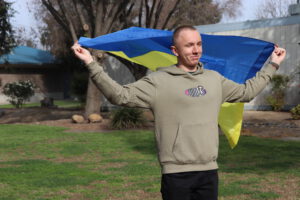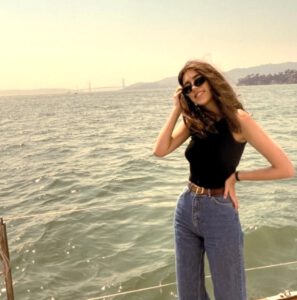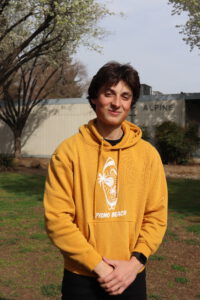The Russian invasion of Ukraine on Feb. 24 has displaced roughly 1 million Ukranians. While the rest of the population is hunkering down in World War II bomb shelters or metro stations, foreign exchange students in the United States are yet another group of refugees wondering when they will be able to return home.
These are the stories of three foreign exchange students. Two are trying to navigate the evolving war in their home-country and one saw it coming a long time ago.
Bohdan Ryzhko, 17
Kovel, Ukraine
‘I just want to be with my family. Whether it be in Ukraine or future Russia’

On the second day of Russia’s invasion into Ukraine, Bohdan Ryzhko stood in line at his American school’s cafeteria trying to pretend it was a normal day. But, while waiting to order his lunch, he received a dizzying message from his mother.
“In the message, she said I am praying for us, that we will be alive and safe,” Ryzhko said, adding that reading it brought tears to his eyes. “In that moment, I just felt like I could fall down on the ground.”
Ryzhko is from Kovel, a town in northwestern Ukraine. He said his town is small, most people there herd livestock or work in their historic downtown.
Since last Thursday, sounds of air strike explosions from the nearest city, Lutsk, have reverberated through the countryside. Including in his town, Kovel.
“There are sirens everyday, and my mom says it is very weird to hear that sound especially in the middle of the night,” Ryzhko said.
His mother also told him that she frequently sees tanks creeping down the streets in Kovel, but she is unsure if they belong to Ukrainian or Russian military forces.
For now, no airstrikes have targeted his city, but that doesn’t stop Ryzhko from worrying. “I can’t do anything except check if my family is safe. I can’t focus on anything–it’s impossible,” he said.
When Ryzhko left Kovel last August, it was the beginning of his senior year. He was excited for the opportunity to study in Visalia at University Preparatory High School. Now, despite the war, he can hardly wait to return to his family.
There are only two months left of his study abroad, but it could be longer depending on how the war evolves. The airways are currently closed and Ryzhko has no idea what the coming months are going to bring.
“I just want to be with my family. Whether it be in Ukraine or future Russia,” he said.
Vasilisa Yukhno, 16
Kharkiv, Ukraine
‘What if they die, and we don’t know?’

“We are all Slavic people, when you look into my eyes, they are the same as yours. Why would you [Russian military forces] want to kill me? Why would you want to kill my family? ” Vassilisa Yukhno asked while shaking her hands in frustration.
Yukhno is a fashionable and intelligent 16-year-old from Kharkiv, Ukraine. She attends Lemoore High School for her senior year foreign exchange program. After graduation, she had plans to study in the medical field at an American university.
But, given the war in her home-country, all bets are off.
Kharkiv is located on the northeastern border of Ukraine, right above two sepratist-controlled territories, Luhansk and Donetsk. For a week, the city has been consistently attacked by Russian forces intent on occupying it.
The conflict between Russia and Ukraine started when Yukhno was in fourth grade. “I remember kids from Luhansk and Donetsk joined my class and told us scary things about living there,” she said. “I was only a kid, I didn’t really understand.” Most of her life, she lived peacefully with her parents–who work in the Ukrainian film industry.
Since she grew up so close to Russia, her first language is Russian, and she has friends in Moscow and St. Petersburg. Like most people in Ukraine, she didn’t think something like this conflict would ever happen.
“To be honest, I was laying in bed finishing the season finale of Euphoria when my host mom came into my room and told me to call my mother,” Yukhno said this was when she learned her city was under attack.
“I was on the phone with my mother, it was 5 a.m. in Kharkiv. She said the bombs were ratteling the windows. At that moment I just started crying,” she said.
The next day in school, none of her American peers knew what happened, “at first, no one even asked me how I was doing,” she said.
Yukhno has fallen into a routine since last Thursday: wake up, make sure her family is still alive, scroll through recent headlines, go to school, back home to sleep, and repeat.
She checks in on her family when they wake up and go to sleep. Like Ryzhko, it is hard for her to focus on anything else.
Her mother said food is scarce in Kharkiv. There is nothing left in the grocery stores and civilians are restricted from traveling in the city. Her mom spends her days sitting next to the door in case she needs to leave and find shelter from one of the many bombs barraging the city.
But her family is running out of food and they can’t leave their elderly dog who is not good at traveling, Yukhno said.
“They told me they only have a few dumplings left in the freezer,” Yukhno’s eyes filled with tears as she grapples with this new reality. “That is scary because if they don’t die from war–they’ll die from starvation.”
Her grandparents live an hour away from her parents in Kharkiv. “Their area is one of the most dangerous right now,” Yukhno said. The bombs destroyed so many electricity lines, her grandparents are having a hard time getting the power to work in their home.
This puts their communication with Yukhno and the rest of the family in jeopardy. “What if they die, and we don’t know?” she said.
While Yukhno lives out the war in the United States, her Russian friends in Moscow and St. Petersburg seem to be living in a different reality.
“The funniest thing is that I have Russian friends who are telling me that it isn’t true. They say my president is lying, and that Russia only wants to make peace,” she said her friends are convinced that her family is also lying to her.
“I never expected they were going to invade, even the day before. They are smart people! Smart people would never do this. My mother and I both feel betrayed,” she said.
Yukhno calls her mother “a strong Slavic woman” and anyone interacting with Yukhno could say the same about her. Despite the destruction of her home city, she remains calm and hopeful that things will be resolved.
“Right now, I’m really ok,” she said, with a slight quiver, “but I’m going to cry when I see my city destroyed.”
Luka Mamuladze, 18
Tibilisi, Georgia
‘I was 4 years old when my Father went to war’
Luka Mamuladze is a Senior from Georgia and attends University Preparatory High School with Bohdan Ryzhko. He is not surprised that Russia invaded Ukraine, only that it turned violent so quickly.
 When he first arrived in the US, the most common question he answered was not “what is the weather like in your country,” it was “wait? Isn’t Georgia a state in America?”
When he first arrived in the US, the most common question he answered was not “what is the weather like in your country,” it was “wait? Isn’t Georgia a state in America?”
He never loses patience with this question, calmly explaining that Georgia sits on the southeast corner of the Black sea, bordering Russia to the north, Azerbaijan and Armenia to the east.
Mamuladze lives in Georgia’s capital city, Tbilisi. He is proud of his country, and takes every chance to talk about it’s history, cuisine, and any of the 25,000 rivers that bring him purified-ready-to-drink water.
“In English Tbilisi means warm,” he said. And the city truly is warm, filled with Georgian soul food, and a live hot spring in the historic city center.
Despite these amenities, Georgia has experienced a cumbersome battle for independence.
“Everyone has sympathy for Ukraine, but Georgians understand it more,” Mamuladze said. “I was four years old when my father went to war.”
He said sometimes he still has vague flashbacks to 2008, when Russia invaded and declared occupation over Tskhinvali, a central region of Georgia located to the North of the capital city, Tbilisi.
Georgia could barely defend itself, “think about the size of Ukraine’s capital city, Kyiv. That is the size of my entire country. One city, think about that.”
Now, the territory has a moving border and inches closer to Mamuladze every day.
On Thursday, Mar. 3, the Georgian Prime Minister, Irakli Garibashvili signed a petition for the country to be recognized as part of the European Union, “I was very worried about this decision because it could provoke Russian military forces in my country,” he said.
As he completes the last two months of his exchange program, Mamuladze tries not to think about the conflict, “It is something I will think about when I get home.” He said he still keeps up with news headlines to stay informed.
“It is hard enough to try and distract my friends, but when I put myself in their shoes, how worried they must be? I can hardly imagine,” Mamuladze said.
